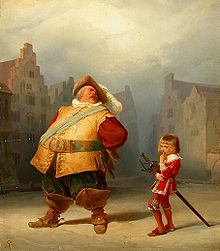John Falstaff
| John Falstaff | |
|---|---|
| Henriad character | |

Adolf Schrödter: Falstaff and his page
|
|
| Created by | William Shakespeare |
| Information | |
| Gender | Male |
| Occupation | Knight |
| Religion | Christian |
| Nationality | English |
Sir John Falstaff is a fictional character who appears in three plays by William Shakespeare. In the plays Henry IV, Part 1 and Part 2, he is a companion to Prince Hal, the future King Henry V. In The Merry Wives of Windsor, he is the buffoonish suitor of two married women.
Though primarily a comic figure, Falstaff still embodies a kind of depth common to Shakespeare's major characters. A fat, vain, boastful, and cowardly knight, he spends most of his time drinking at the Boar's Head Inn with petty criminals, living on stolen or borrowed money. Falstaff leads the apparently wayward Prince Hal into trouble, and is ultimately repudiated after Hal becomes king.
In Act II, Scene III of Henry V, his cold feet and legs at the time of death are described by Mistress Quickly in terms that some scholars have ascribed to Plato's description of the death of Socrates after drinking hemlock.
Falstaff has since appeared in other media, notably in operas by Giuseppe Verdi, Ralph Vaughan Williams and Otto Nicolai. The operas focus on his role in The Merry Wives of Windsor.
He appears in the following plays:
His death is mentioned in Henry V but he has no lines, nor is it directed that he appear on stage. However, many stage and film adaptations have seen it necessary to include Falstaff for the insight he provides into King Henry V's character. The most notable examples in cinema are Laurence Olivier's 1944 version and Kenneth Branagh's 1989 film, both of which draw additional material from the Henry IV plays.
...
Wikipedia
